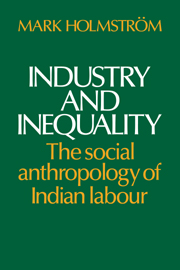7 - A dual economy and society?
Published online by Cambridge University Press: 05 February 2012
Summary
I began with three kinds of question (pp. 7–8) which can now be reduced to two: more objective questions about people's real economic situation; and questions more accessible to the methods of social anthropology, about their thinking and how this explains their actions.
First, since most organized sector workers are clearly better off than most unorganized sector industrial workers, how sharp are the boundaries and how easy to cross, who share the benefits of organized sector employment and who are excluded? Is it true that the Indian industrial economy is a dual economy, where the whole organized sector – owners, managements, workers and unions – form a privileged enclave or élite, at the expense of the whole unorganized sector – owners and workers alike – which is prevented from realizing its potential for employment and production; and these unorganized sector workers, like peasants and others outside industry, get the backwash of industrialization not the benefits? Should we say organized sector workers are well off and the others are badly off, or because the others are badly off?
Secondly, the same problems seen from inside by the people themselves. Do organized and unorganized sector workers think and act is if it were a dual or multiple economy? For example, do they see themselves as two or more classes with separate or even conflicting interests? Do they live in different social and mental worlds, meeting and helping only their own kind?
- Type
- Chapter
- Information
- Industry and InequalityThe Social Anthropology of Indian Labour, pp. 310 - 323Publisher: Cambridge University PressPrint publication year: 1984

